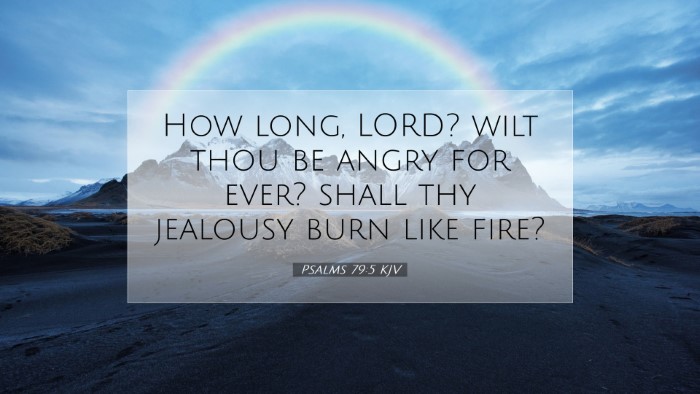Psalms 79:5 Commentary
Psalms 79:5 states, "How long, O Lord? Will you be angry forever? Will your jealousy burn like fire?" This verse encapsulates a profound moment of desperation and inquiry, as the psalmist seeks understanding of God’s wrath and longs for divine intervention in the face of suffering.
Contextual Overview
The context of Psalm 79 is significant as it deals with national lament and collective grief experienced by Israel during the Babylonian captivity. The psalmist speaks for the people who are suffering not only from physical desolation but also spiritual anguish due to their disobedience to God. This setting invites a profound theological reflection on the nature of God’s anger, mercy, and the human condition.
Theological Implications
This verse draws attention to key theological themes: the character of God, the reality of sin, and the persistent plea for mercy. The opening question, "How long, O Lord?", echoes throughout Scripture, signifying a longing for divine timing and intervention. The psalmist acknowledges God’s sovereignty and justice while grappling with the painful experience of prolonged suffering.
The Anger of God
The psalmist’s mention of God’s anger prompts an examination of what it means to be ‘jealous’ in the context of divine emotions. Matthew Henry comments that such jealousy is akin to a protective love that does not tolerate idolatry or injustice. It reflects God’s desire for a faithful relationship with His people. Henry’s insight posits that while God’s anger may seem unrelenting, it is directed towards the unrepentant heart rather than the sincere cry for restoration.
The Question of Duration
The rhetorical question, "Will you be angry forever?", indicates a deep yearning for the nearness of God’s grace, even amidst judgment. Albert Barnes elaborates on the perspective that God’s anger, although intense, is not eternal. He emphasizes that God's punishment is corrective and ultimately aims to restore the relationship with His people. The psalmist's plea reflects a common theme found in Psalms where a balance between divine justice and mercy is sought.
Literary and Poetic Devices
The poetic structure of the psalm plays a crucial role in conveying its emotional weight. The use of questions captures an intimate dialogue with God, urging readers to contemplate their own experiences of spiritual desolation. Adam Clarke highlights the significance of rhetorical questioning as a means of expressing an earnest appeal to God. The vivid imagery of jealousy burning like fire serves as a metaphor for the intense nature of God’s displeasure, while also invoking fear of His prolonged absence.
Application for Contemporary Believers
For modern readers, Psalms 79:5 encourages reflection on the nature of suffering in relation to sin and God's character. It prompts believers to acknowledge the consequences of disobedience while also holding onto the hope of God’s eventual mercy. This balance is essential for spiritual health; understanding that while God's anger is serious, His mercy is transformative.
Call to Repentance
The plea from the psalmist can serve as a catalyst for repentance. Pastors and leaders may utilize this verse to remind congregations that sincere cries for help are met with divine empathy. A culture of repentance is encouraged, where believers are urged to consider their own lives in light of God’s character.
Encouragement to Persevere
Furthermore, this verse serves as encouragement for believers in times of distress. The acknowledgment of God’s anger can be a source of comfort for those who feel forgotten or abandoned. Knowing that their suffering is witnessed by God allows for the hope that eventually, God's merciful response will be revealed. This duality of divine anger and mercy echoes through the lessons of prophecy and fulfillment found throughout Scriptural history.
Conclusion
Psalms 79:5 is a powerful testimony to the struggles of a community in despair, inviting believers today to confront their questions of suffering with honesty and faith. By wrestling with such profound questions, pastors, students, and theologians are called to explore God’s character and the truths of His everlasting covenant. The inquiries embodied in this verse remain as relevant now as they were then, challenging each generation to seek God's presence with a fervent heart, alive to His justice and mercy.
As we meditate on this scripture, let us remember the assurance that God hears our cries and is ever willing to respond to our desires for reconciliation and restoration. In times of turmoil, may we echo the words of the psalmist, confidently bringing our inquiries before God as we await His gracious answer.


